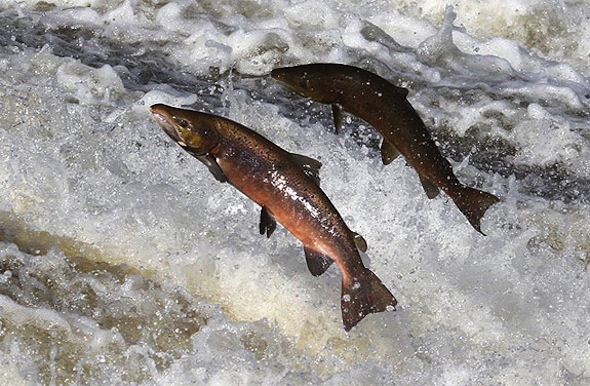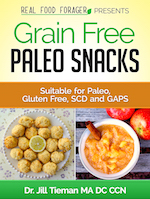The other day I watched an incredibly moving documentary entitled Salmon Confidential, (linked below) which reveals some of the shocking controversies surrounding the practice of salmon farming in British Columbia, Canada.
The film documents biologist Alexandra Morton’s efforts to gather evidence about the devastating impact salmon farming is having on the health of local wild populations of salmon. It also exposes the Canadian government’s attempts to cover up and prevent such evidence from being made public.
http://www.youtube.com/watch?v=UM-pkQTGDEU
Farmed Salmon Breeding Grounds for Pathogenic Parasites and Viruses
Morton and others maintain that aquatic feedlots where farmed salmon are raised in captivity are breeding grounds for concentrated amounts of pathogenic parasites and viruses which are infecting wild salmon, causing massive ‘pre-spawn’ die off. This means wild salmon are – dying before they have the opportunity to reproduce – from infectious diseases being proliferated by salmon farms, which is contributing to the decimation of the wild salmon population.
Morton and other scientists have positively tested numerous dead wild salmon for specific viruses they suspect these fish have contracted from farmed salmon.
However the Canadian government, which has a vested financial interest in the export of farmed fish, insists that farmed fish do not pose a threat to the health of wild salmon. Government officials continue to deny the existence of virulent viruses in the farmed salmon population and prohibit independent lab testing of farmed fish for disease causing microorganisms.
Watching this movie really validated and reinforced the decision I made many years ago to stop buying farmed fish. It also made me want to share this information with others who may not be aware of the many reasons to be mindful about choosing only wild caught fish for our personal consumption.
Wild Salmon – Robust and Nourishing
Ever since we were young, most all of us have become familiar with the captivating natural phenomenon of wild salmon as they make their epic journey swimming upstream from the sea through freshwater rivers and tributaries, to eventually spawn in the very same location where they themselves were spawned.
Imagery of wild salmon is iconic, and it’s inspiring to witness these magnificent, powerful and athletic creatures strain against strong river currents and thrust themselves up into the air out of rushing rapids and waterfalls in their unrelenting zeal to migrate homeward, to the place of their birth.
Through eons of time wild salmon have been a key species in the environments where they flourish because they serve as a nutrient dense food source for a variety of other animals, and because their decomposing bodies provide essential, life giving elements to surrounding vegetation.
Besides providing vital sustenance for myriad other species, wild salmon have also served for many thousands of years as a versatile, delicious and deeply nourishing food for human beings.
Factory Farming Fish
Even though edible wild salmon have long been an abundant resource, the practice of aquaculture, or the concentrated farming of fish in confined pens, has expanded exponentially in recent decades, with production increasing ten-fold between 1982 and 2007.
From detrimental environmental effects, to questionable health implications for wild fish populations, to concerns about the quality of the food they produce, there’s no lack of controversy surrounding fish farms.
Here are some of the main reasons to avoid purchasing farmed fish:
- Salmon farmed for food live in incredibly unnatural confined conditions, enduring extreme levels of stress, which makes them particularly vulnerable to infection from a variety of pathogenic bacteria, viruses and parasites.
- Farmed salmon are forced to live their entire lives in enclosures designed to contain large numbers of animals in a finite area. Because the fish are in such close confinement, their bodies constantly scrape against each other as well as the sides of their pens, causing lesions to their scales and fins which are prone to infection.
- There is evidence that the concentrated amounts of pathogenic organisms generated in farmed fish feedlots and released into surrounding waters are having a disastrous effect on the health of the wild salmon population.
- Farmed fish are routinely given antibiotics to counteract the prevalence of disease causing pathogens to which they are so vulnerable.
- Many farmed fish are fed compound “fish feeds” which may contain feather meal, wheat byproducts, corn and soybean meal. And as we know, most corn and soy these days is genetically modified and sprayed with toxic industrial agricultural petrochemicals.
- Most adult species of salmon are carnivorous fish whose natural diet does not include plant based, land grown proteins such as those derived from wheat, corn or soy.
- Tests of farmed salmon show they contains elevated levels of toxins such as dioxins, chlorinated pesticides and PCBs .
- Fish farms release tremendous amounts of wastes (feces) in concentrated areas which can have a potentially detrimental impact on surrounding marine environments.
If it’s Not Labeled “Wild” it’s Probably Farmed
Farmed fish is astonishingly ubiquitous in our food system. However because it’s not labeled as such, many people are unaware of what they’re purchasing.
If the salmon or other fish or seafood you see for sale at the market does not say “wild” on the label, chances are very good that it came from a fish farm.
Even much of the fish sold in restaurants is farmed. If you’re out at a restaurant and see ‘Fresh Atlantic Salmon’ on the menu, if it doesn’t specifically say it’s wild caught, it’s virtually certain to be farmed.
If you have any doubts about whether the fish you’re about to purchase at a store or order at a restaurant is wild or farmed, be sure to ask your retailer or food server for clarification.
Genetically Engineered Frankenfish
Biotech companies such as AquaBounty Technologies have been experimenting with the creation of genetically engineered salmon, which have been designed to grow unnaturally fast and large. All such fish, when and if they are made legal for sale, will also be farmed.
Because labeling genetically modified organisms is not yet required by US law, the potential existence of such mutant, farmed salmon is yet another very important reason to purchase nothing but wild caught salmon.
Vote With Your Money
The more people who understand the reasons why to avoid the purchase of farmed fish, the less revenue the companies that conduct the business of fish farming will earn.
When purchasing fish and seafood for yourself and your family to eat, be sure to choose wisely, choose consciously and choose wild!
Where to buy high quality wild fish
This post was written by Linda Zurich
An avid independent researcher, writer, speaker, foodie, herbalist, gardener, lifelong lover of nature and perpetual student, Linda Zurich is the author of Detoxification: 70 Ways to Cleanse, Clear and Purify Your Body, Space and Life.
Dedicated to empowering people with the understanding that our bodies are imbued with a profound healing intelligence, Linda is devoted to broadening as well as sharing her ever evolving knowledge of the most natural and efficacious methods through which we may activate that innate healing wisdom.
Her writings on a wide variety of subject matter as well as information about her upcoming speaking engagements can be found at her website, Holistic Paths to Healing and Wellness, at www.lindazurich.com











